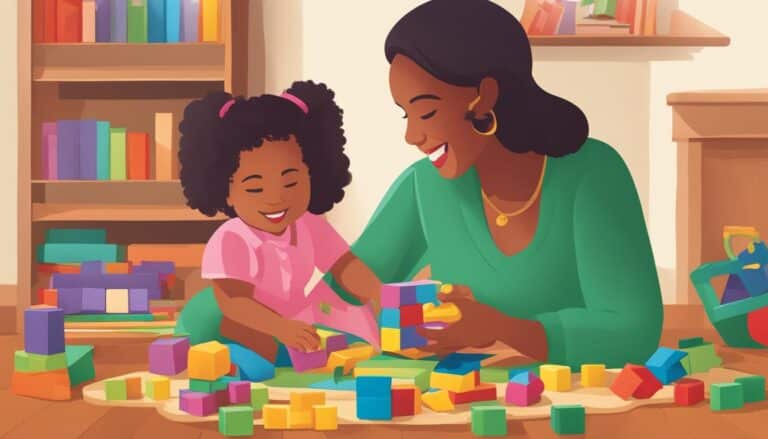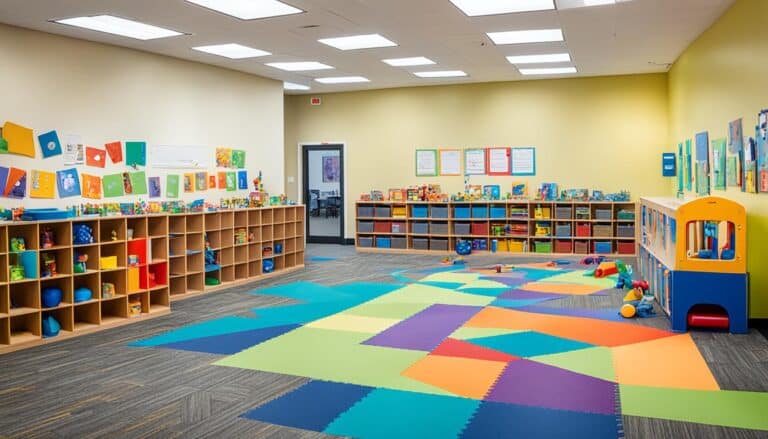Fostering Self-Esteem in Young Children: A Parent’s Guide
Hello, I’m excited to share with you a parent’s guide on fostering self-esteem in young children. As a parent, I understand that nurturing your child’s self-esteem is essential for their overall well-being and success in life. By providing them love, support, and positive reinforcement, you can help shape their positive sense of self, confidence, and resilience.
Building self-esteem in young children involves more than just praising their achievements. It is about encouraging their individuality, promoting a growth mindset, and teaching them the importance of self-care. By instilling these values early on, you are setting your child up for success in all areas of life.
Throughout this guide, I will share valuable insights on the importance of self-esteem in young children, effective strategies for fostering self-esteem, and creating a nurturing environment for their development. Let’s embark on this journey together, and unlock the immense potential within your child.
Key Takeaways:
- Self-esteem is crucial for young children’s emotional and social development.
- High self-esteem helps children believe in their capabilities and bounce back from failures.
- Unconditional love and acceptance are vital in fostering self-esteem.
- Encouraging autonomy and promoting a growth mindset support self-esteem development.
- Creating a nurturing environment involves a safe and secure home, consistent routines, and positive communication.
Understanding the Importance of Self-Esteem in Young Children
Self-esteem plays a significant role in young children’s emotional and social development. It affects their ability to make healthy choices, handle challenges, and form positive relationships. When children have high self-esteem, they are more likely to believe in their capabilities, take on new challenges, and bounce back from failures. On the other hand, low self-esteem can result in feelings of inadequacy, self-doubt, and fear of trying new things.
Building self-esteem in young children is crucial for their overall well-being and success in life. By fostering a positive self-view, parents can help their children thrive and navigate life’s ups and downs with confidence.
Research has shown that children with high self-esteem tend to:
- Have a positive outlook on life
- Be more resilient in the face of adversity
- Form healthier relationships with peers and adults
- Be more motivated to achieve their goals
- Take responsible risks and seek new opportunities
On the other hand, children with low self-esteem may:
- Engage in negative self-talk and self-criticism
- Avoid challenges and new experiences
- Experience difficulties in social interactions
- Lack confidence in their abilities and potential
- Be more prone to anxiety and depression
It is essential for parents to understand the importance of fostering self-esteem in young children and actively work towards promoting a positive self-view. By doing so, parents can lay a foundation for their children’s emotional well-being and future success.
“When children have high self-esteem, they are more likely to believe in their capabilities, take on new challenges, and bounce back from failures.” – Researcher Jones
Fostering Self-Esteem through Positive Reinforcement
One of the key ways to nurture self-esteem in young children is through positive reinforcement. Providing praise, encouragement, and recognition for their efforts and achievements helps children develop a sense of competence and value. This can be done by:
- Celebrating their successes, no matter how small
- Focusing on their strengths and abilities
- Offering specific and genuine compliments
- Showcasing pride in their accomplishments
By emphasizing and reinforcing positive behaviors and qualities, parents can help children develop a healthy sense of self-worth.
| Benefits of High Self-Esteem | Consequences of Low Self-Esteem |
|---|---|
| Positive outlook on life | Negative self-talk and self-criticism |
| Resilience in the face of adversity | Avoidance of challenges and new experiences |
| Healthy relationships with peers and adults | Difficulties in social interactions |
| Motivation to achieve goals | Lack of confidence in abilities |
| Willingness to take responsible risks | Proneness to anxiety and depression |
Strategies for Fostering Self-Esteem in Young Children
When it comes to nurturing self-esteem in young children, parents play a pivotal role. By implementing effective strategies, parents can help build a strong foundation of self-worth and confidence in their children. Here are some practical strategies that can foster self-esteem in young children:
- Provide Unconditional Love and Acceptance: Children need to know that they are unconditionally loved and accepted for who they are, regardless of their achievements or behavior. Expressing love and acceptance creates a secure emotional foundation for children to develop a positive self-image.
- Offer Praise and Encouragement: Instead of solely focusing on outcomes, it is important to praise and encourage children for their efforts. Acknowledge their hard work, perseverance, and the progress they make, reinforcing their sense of achievement and building their self-confidence.
- Promote Autonomy and Independence: Encouraging children to make choices and decisions within appropriate boundaries helps them develop a sense of competence and self-reliance. Allow them to take age-appropriate responsibilities and celebrate their independent achievements.
- Embrace a Growth Mindset: Teach children that their abilities and intelligence can grow through effort, perseverance, and learning from mistakes. Encourage them to embrace challenges as opportunities for growth, building resilience and a positive view of themselves as capable learners.
- Model Positive Self-Talk: As parents, it’s crucial to model positive self-talk and display self-confidence. Children learn by observing their caregivers, so demonstrating self-esteem and resilience can have a significant impact on their own self-perception.
Supporting young children’s self-esteem involves creating an environment where they feel valued, capable, and loved. By employing these strategies, parents can empower their children to develop a strong sense of self-worth, confidence, and resilience.

Comparison of Strategies for Fostering Self-Esteem
| Strategy | Effect |
|---|---|
| Providing Unconditional Love and Acceptance | Creates a secure emotional foundation and promotes a positive self-image. |
| Offering Praise and Encouragement | Builds self-confidence and a sense of achievement. |
| Promoting Autonomy and Independence | Develops a sense of competence and self-reliance. |
| Embracing a Growth Mindset | Fosters resilience and a positive view of oneself as a capable learner. |
| Modeling Positive Self-Talk | Influences children’s self-perception and promotes self-esteem. |
Creating a Nurturing Environment for Self-Esteem Development
Creating a nurturing environment is crucial for the development of self-esteem in young children. By providing a safe and secure home environment, establishing consistent routines, and promoting positive communication and problem-solving skills, parents can lay the foundation for healthy self-esteem.
At home, it is important to create a safe and secure space where children feel loved, accepted, and valued. This can be achieved by setting clear boundaries, offering emotional support, and encouraging open and honest communication. By creating a nurturing environment, children can develop a sense of trust and confidence in themselves and their abilities.
Consistency is key when it comes to building self-esteem. Establishing regular routines can provide children with a sense of stability and predictability, which contributes to their feelings of security and self-worth. Routines help children understand what is expected of them and provide a sense of accomplishment as they successfully navigate their daily tasks and responsibilities.
Positive communication and problem-solving skills are essential for fostering self-esteem. By modeling effective communication and conflict resolution techniques, parents can teach children how to express themselves, resolve conflicts, and navigate challenging situations. This equips children with the tools they need to handle setbacks and interpersonal relationships with confidence and assertiveness.

In addition to creating a nurturing environment at home, parents can also play a crucial role in promoting self-esteem by modeling self-esteem and positive self-talk. Children often learn by observing the behavior of their caregivers, so it is important for parents to display self-confidence, resilience, and self-care. By demonstrating self-esteem in action, parents can inspire children to develop a positive self-view and belief in their abilities.
Furthermore, fostering meaningful connections with friends, family, and the community can contribute to a child’s self-esteem. Building strong relationships and a sense of belonging can provide children with the support and validation they need to develop a positive sense of self. Encouraging participation in social activities, extracurriculars, and community service can foster a sense of purpose and connection, further enhancing a child’s self-esteem.
Overall, creating a nurturing environment is essential for self-esteem development in young children. By providing a safe and secure home, establishing routines, promoting effective communication, and modeling self-esteem, parents can empower their children to develop a positive self-view and navigate life with confidence and resilience.
Conclusion
Fostering self-esteem in young children is one of the most important responsibilities of a parent. By recognizing the significance of self-esteem, employing effective strategies, and establishing a nurturing environment, parents can play a crucial role in supporting their children’s self-esteem development. This, in turn, contributes to their overall well-being and sets the stage for future success.
Building self-esteem in young children involves providing unconditional love and acceptance, offering praise and encouragement for their efforts, and promoting autonomy and independence. By emphasizing a growth mindset and teaching children to learn from their mistakes, parents can help them develop a positive self-view and a belief in their own capabilities.
Creating a nurturing environment is equally important. This includes providing a safe and secure home, establishing consistent routines, and modeling self-esteem and positive self-talk as parents. Encouraging meaningful connections with friends, family, and the community fosters a sense of belonging and support, further enhancing children’s self-esteem.
By fostering self-esteem in young children, parents empower them to develop a positive sense of self, confidence, and resilience. This lays the foundation for a happy and fulfilling life. As parents, it is our responsibility to prioritize self-esteem and support our children in their journey of self-discovery and personal growth.
FAQ
How does fostering self-esteem in young children benefit their overall development?
Fostering self-esteem in young children helps them develop a positive sense of self, confidence, and resilience. It sets them up for success in all areas of life.
What is the role of self-esteem in young children’s emotional and social development?
Self-esteem plays a significant role in young children’s ability to make healthy choices, handle challenges, and form positive relationships. It affects their overall well-being and confidence.
What strategies can parents use to foster self-esteem in young children?
Parents can provide unconditional love and acceptance, offer praise and encouragement for efforts, encourage autonomy and independence, promote a growth mindset, and create a nurturing environment.
How does a nurturing environment contribute to self-esteem development in young children?
A nurturing environment provides a safe and secure space for children to thrive. It includes consistent routines, positive communication, problem-solving skills, and modeling positive self-esteem behaviors.
Why is fostering self-esteem in young children important for parents?
Fostering self-esteem in young children is vital for their overall well-being and future success. It helps children develop a positive sense of self, confidence, and resilience.
Source Links
- https://www.psychologytoday.com/nz/blog/animal-emotions/202401/how-to-overcome-childrens-fear-of-dogs
- https://www.texomashomepage.com/tuesdays-child/joselyn-01-16-24/
- https://www.studocu.com/en-us/document/middle-georgia-state-university/introduction-to-psychology/psy245-ch-8-emotional-social-dev-in-early-childhood/81590044






